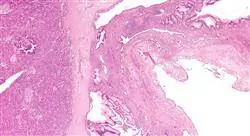University certificate
The world's largest faculty of medicine”
Introduction to the Program
La constante especialización del médico es decisiva en la toma de decisiones de los pacientes con patología hepatobiliar y pancreática.
Los avances diagnósticos y un mejor conocimiento de la fisiopatología de las enfermedades hepatobiliares han permitido avances extraordinarios en el tratamiento de estos pacientes, especialmente en lo que respecta al desarrollo de la colecistectomía laparoscópica, uno de los procedimientos más frecuentemente realizados en nuestro medio por la mayoría de los cirujanos generales.
Por otro lado, la cirugía pancreática ha avanzado mucho con la laparoscopia, especialmente en el campo de la pancreatectomía distal para tumores quísticos y neuroendocrinos, además de jugar un papel importante en la estadificación de los tumores pancreáticos. Para el tratamiento radical de las neoplasias Para el tratamiento radical de las neoplasias localizadas en el duodeno, región periampular, confluente biliopancreático y cabeza pancreática, la duodenopancreatectomía cefálica es la técnica quirúrgica de elección, pero también puede ser el tratamiento de elección para algunas enfermedades benignas como como pancreatitis crónica o lesiones premalignas como algunos tumores neuroendocrinos.
El propósito de este Diploma de Postgrado en Cirugía Hepatobiliar y Pancreática y del equipo de expertos que lo han desarrollado, es brindar esta actualización de manera práctica, las últimas técnicas quirúrgicas bariátricas y esofagogástricas, a través de la última tecnología educativa en el campo de la cirugía esofagogástrica. .
La evidencia científica aumenta la calidad de la atención médica. Mantenerse actualizado es clave para brindar una mejor atención a los pacientes con problemas hepatobiliares y pancreáticos”
Este Postgraduate diploma en Hepatobiliary and Pancreatic Surgery contiene el programa científico más completo y actualizado del mercado. Las características más importantes del programa incluyen:
- Contiene casos clínicos presentados por expertos. Los contenidos gráficos, esquemáticos y eminentemente prácticos con los que están elaborados aportan información científica y práctica sobre las disciplinas imprescindibles para el ejercicio profesional
- Novedades diagnóstico-terapéuticas en la atención del paciente con problemas hepatobiliares y pancreáticos
- Presentación de talleres prácticos sobre procedimientos, técnicas diagnósticas y terapéuticas de enfermedades infecciosas y guías de cirugía hepatobiliar
- Vídeo lecciones sobre las diferentes patologías y su abordaje
- Sistema de aprendizaje interactivo basado en algoritmos para la toma de decisiones en las situaciones clínicas presentadas
- Lecciones teóricas, preguntas al experto, foros de debate sobre temas controvertidos y trabajos de reflexión individuales
- Disponibilidad de los contenidos desde cualquier dispositivo fijo o portátil con conexión a internet
Este Postgraduate diploma puede ser la mejor inversión que puedes hacer en la selección de un programa de actualización por dos razones: además de actualizar tus conocimientos en la atención a pacientes con patología hepatobiliar y pancreática, obtendrás un Diploma de Postgrado de ## UNIVERSIDAD_SIGLAS##"
Su personal docente incluye destacados cirujanos, que aportan a esta formación la experiencia de su trabajo, además de otros especialistas pertenecientes a sociedades científicas de prestigio.
Los contenidos multimedia desarrollados con la última tecnología educativa proporcionarán al profesional un aprendizaje situado y contextual, es decir, un entorno simulado que le proporcionará un programa de formación inmersivo para entrenar en situaciones reales.
Este programa está diseñado en torno al Aprendizaje Basado en Problemas, mediante el cual el médico debe intentar resolver las diferentes situaciones de práctica profesional que se presentan durante el curso. Esto se realizará con la ayuda de un innovador sistema de video interactivo creado por reconocidos expertos en Hepatobiliary and Pancreatic Surgery, con amplia experiencia docente.
Aumenta tu confianza en la toma de decisiones actualizando tus conocimientos con este curso Postgraduate diploma"
No pierdas la oportunidad de actualizar tus conocimientos en la atención de pacientes con patología Postgraduate diploma para incrementar la calidad de la atención médica diaria"
Why study at TECH?
TECH is the world’s largest online university. With an impressive catalog of more than 14,000 university programs available in 11 languages, it is positioned as a leader in employability, with a 99% job placement rate. In addition, it relies on an enormous faculty of more than 6,000 professors of the highest international renown.

Study at the world's largest online university and guarantee your professional success. The future starts at TECH”
The world’s best online university according to FORBES
The prestigious Forbes magazine, specialized in business and finance, has highlighted TECH as “the world's best online university” This is what they have recently stated in an article in their digital edition in which they echo the success story of this institution, “thanks to the academic offer it provides, the selection of its teaching staff, and an innovative learning method aimed at educating the professionals of the future”
A revolutionary study method, a cutting-edge faculty and a practical focus: the key to TECH's success.
The most complete study plans on the university scene
TECH offers the most complete study plans on the university scene, with syllabuses that cover fundamental concepts and, at the same time, the main scientific advances in their specific scientific areas. In addition, these programs are continuously being updated to guarantee students the academic vanguard and the most in-demand professional skills. In this way, the university's qualifications provide its graduates with a significant advantage to propel their careers to success.
TECH offers the most comprehensive and intensive study plans on the current university scene.
A world-class teaching staff
TECH's teaching staff is made up of more than 6,000 professors with the highest international recognition. Professors, researchers and top executives of multinational companies, including Isaiah Covington, performance coach of the Boston Celtics; Magda Romanska, principal investigator at Harvard MetaLAB; Ignacio Wistumba, chairman of the department of translational molecular pathology at MD Anderson Cancer Center; and D.W. Pine, creative director of TIME magazine, among others.
Internationally renowned experts, specialized in different branches of Health, Technology, Communication and Business, form part of the TECH faculty.
A unique learning method
TECH is the first university to use Relearning in all its programs. It is the best online learning methodology, accredited with international teaching quality certifications, provided by prestigious educational agencies. In addition, this disruptive educational model is complemented with the “Case Method”, thereby setting up a unique online teaching strategy. Innovative teaching resources are also implemented, including detailed videos, infographics and interactive summaries.
TECH combines Relearning and the Case Method in all its university programs to guarantee excellent theoretical and practical learning, studying whenever and wherever you want.
The world's largest online university
TECH is the world’s largest online university. We are the largest educational institution, with the best and widest online educational catalog, one hundred percent online and covering the vast majority of areas of knowledge. We offer a large selection of our own degrees and accredited online undergraduate and postgraduate degrees. In total, more than 14,000 university degrees, in eleven different languages, make us the largest educational largest in the world.
TECH has the world's most extensive catalog of academic and official programs, available in more than 11 languages.
Google Premier Partner
The American technology giant has awarded TECH the Google Google Premier Partner badge. This award, which is only available to 3% of the world's companies, highlights the efficient, flexible and tailored experience that this university provides to students. The recognition as a Google Premier Partner not only accredits the maximum rigor, performance and investment in TECH's digital infrastructures, but also places this university as one of the world's leading technology companies.
Google has positioned TECH in the top 3% of the world's most important technology companies by awarding it its Google Premier Partner badge.
The official online university of the NBA
TECH is the official online university of the NBA. Thanks to our agreement with the biggest league in basketball, we offer our students exclusive university programs, as well as a wide variety of educational resources focused on the business of the league and other areas of the sports industry. Each program is made up of a uniquely designed syllabus and features exceptional guest hosts: professionals with a distinguished sports background who will offer their expertise on the most relevant topics.
TECH has been selected by the NBA, the world's top basketball league, as its official online university.
The top-rated university by its students
Students have positioned TECH as the world's top-rated university on the main review websites, with a highest rating of 4.9 out of 5, obtained from more than 1,000 reviews. These results consolidate TECH as the benchmark university institution at an international level, reflecting the excellence and positive impact of its educational model.” reflecting the excellence and positive impact of its educational model.”
TECH is the world’s top-rated university by its students.
Leaders in employability
TECH has managed to become the leading university in employability. 99% of its students obtain jobs in the academic field they have studied, within one year of completing any of the university's programs. A similar number achieve immediate career enhancement. All this thanks to a study methodology that bases its effectiveness on the acquisition of practical skills, which are absolutely necessary for professional development.
99% of TECH graduates find a job within a year of completing their studies.
Postgraduate Diploma in Pancreatic Hepatobiliary Surgery
About one and a half kilograms of weight make the liver the largest organ in the human body. It is not a random factor, the anatomical evolution has known how to give it the relevance it deserves, because, together with the gallbladder, it is in charge of purifying the blood, storing glycogen and secreting the bile so indispensable for the regulation of fats and proteins in the organism. A dysfunction in this system and the entire life of the individual is compromised. At TECH Global University, thinking of providing medical students with special skills to surgically intervene in the pathologies of this region, we have designed the Postgraduate Certificate in Pancreatic Hepatobiliary Surgery: an online program that seeks to delve into the aptitudinal parameters to treat certain abnormalities such as cholelithiasis, primary sclerosing cholangitis, pancreatitis, as well as tumors and cysts that form in the areas involved. You have in front of you one of the most useful, complete and updated academic offers in the market to incorporate new medical knowledge to your curriculum with unparalleled ease.
Specialize as a Hepatobiliary Surgeon
According to the American Cancer Society, in oncological terms, one of the main causes of death worldwide is liver cancer, claiming an average of 700,000 victims each year. Among the various types of this disease, hepatocarcinoma constitutes between 80 and 90% of the cases. One of the items of our Postgraduate Certificate course focuses precisely on this malignant liver tumor. The itinerary of the program also presents other surgical techniques that allow us to deal with neuroendocrine tumors, pancreatic, intestinal and multiviceral transplantation, liver metastases of colorectal and non-colorectal origin, tumor formations in the gallbladder, among others. By accessing our content you can also be trained in the latest surgical innovations such as robotic surgery, NOTES (Natural Orifice Translumenal Endoscopic Surgery or transluminal endoscopic surgery through natural orifices) and ICT (Information Technology and Communications). At TECH we specialize in providing you with the most advanced educational quality with all the versatility of online learning.









